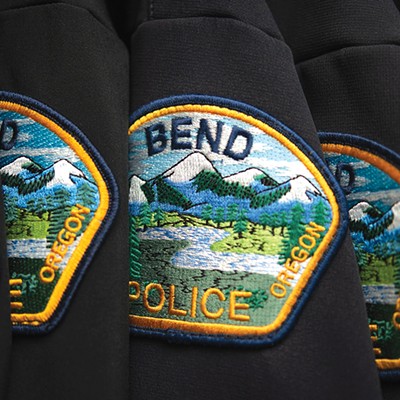When I caught up with Sara Salo this past week she was pumped. That morning, she had been cruising through the deserts of New Mexico at 24 mph, enjoying a strong tailwind that helped her tick-off the 60-mile day faster than she had originally planned.
"How can you make a change in your life?" she says, repeating to me the message she has brought via bicycle to more than 20 schools across four states.
Months ago, the Bend resident hatched a plan that she hopes will give students the tools they need to combat a nationwide epidemic - childhood obesity. And now that she's nearly five months into her 6,000-mile School Food Tour, it appears she's well on her way to seeing her plan through.
Salo earned her Master's degree in public health from Oregon State University last year and then thought, "Now what?" An avid cyclist who had worked in bike shops for years, Salo knew that she wanted to focus on kid's nutrition.
"How do you grab their attention and really get them to reevaluate their choices?" she asks rhetorically, repeating the same question that she mulled over in her own head for months before conceiving of the School Food Tour as a way to promote healthier meals in schools.
Salo, the School Food Tour's founder and sole participant, left Bend in August to pedal and periodically stop at schools to give presentations, conduct community bike rides, and spread the word about healthy living. She also visits local farms that are along her route, encouraging them to work with cafeterias of neighboring schools. Roughly 2,000 miles into her 10-month tour, Salo, 29, reports that her message seems to be getting through.
Salo showered me with story after story about her travels, the kids she has met and the sights that she has seen. She has already pedaled south through California, across Arizona and most of New Mexico and expects to be in Texas this week. Most of Salo's stories involve wide-eyed kids blown away that a woman can hop on a bike and live off the limited supplies affixed to her frame.
"It's fascinating some of the questions they ask, since it's a world that they know nothing about," Salo says.
Is it scary? How do you go to the bathroom? Where do you shower? How do you eat? Those are all common questions, she says, along with, 'What, no makeup?' She knows she's leaving many incredulous young girls stumped in that regard.
In an effort to be as accessible as possible, Salo's presentations are very open and dialogue is encouraged. Once she has the students' attention, she feels like she's able to get her message across.
It wasn't always easy. When she got started, Salo wasn't sure how an unfamiliar woman riding a bike that sports a flag with a carrot on it would be received when she rolled up to school cafeterias, even though the presentations are always prearranged with school officials.
"I thought, 'Oh, shit, I don't know how this is going to go over,' but then I found that they're totally engaged," says Salo.
She goes on to tell me about an inner-city L.A. student who was inspired to stand in front of his peers and explain how, through sports and healthy eating, he lost 200 pounds.
"That's my exact message - making small changes like choosing a salad rather than a hamburger for lunch. I think it's super important for his classmates to hear it from a peer rather than have an authority try to drill this into them," Salo says. Her travels have taken her to schools with working gardens that supply their own produce, like the school she visited in Occidental, Calif., where students participate in a gardening class once a week.
These programs work because the schools have employees who champion the cause, she says.
"It can't be a secondary thought; it needs to be a priority to make that transition," says Salo, who has seen both the best and worst of what the nation's school menus offer.
Plenty of work has been done here in Central Oregon to meet and exceed the somewhat low national school nutrition standards, standards that recently drew fire because they allow a slice of pizza to count as a vegetable serving.
"A little tomato sauce is NOT a vegetable," says Bend-La Pine Wellness Specialist Katrina Wiest. "That does not figure into our menu pattern."
The issue of school nutrition and kids' health is one that goes beyond Bend. It's a national discussion that has reached the White House and the halls of Congress as of late amid growing evidence that kids are becoming less active and less healthy than previous generations.
Almost a year ago to the day President Obama signed the child nutrition bill into law, a small but important step forward for an administration looking to boost the nation's low standards. The bill, motivated in large part by First Lady Michelle Obama and her campaign to end childhood obesity, was meant to improve school nutrition while providing school lunches to a greater number of students. This past month, Congress dealt the administration a blow when it blocked a USDA measure that would have - for the first time in 15 years - implemented changes to school cafeterias across the country.
Central Oregon is fighting back as cafeterias across the school district now boast an impressive display of fresh, local produce, a direct function of the Farm to School initiative and the efforts of Wiest. The wellness specialist has organized weekly deliveries from local farmers who agreed on a favorable price since the district purchases in such large quantities. The Farm to School program is a nationwide initiative that helps farmers coordinate with local schools interested in bulk purchasing. The Bend-La Pine district signed onto the program seven years ago. Because of Farm to School and other advances, the district is able to make most of its food from scratch. The master kitchen at Bend High School that serves the district bakes all its own bread, pizza dough and bagels (using 60 percent whole wheat flour from Bob's Red Mill, a Milwaukie, Ore. company), produces its own dressings and sauces and incorporates as many regional products as possible. What's good for the students' health, is also good for the local economy, notes Terry Cashman, the district's nutrition services supervisor.
"Our goal is to get as much locally as we can," says Cashman. "We'd like to eventually see most all of our items made from scratch."
Last week, I went to see and taste for myself what gets dished up to students. When I met Cashman he was chomping on a steamed green bean that had been lightly coated with a fresh garlic dressing.
"Have you tried these? They're great," he says enthusiastically.
While I didn't get a chance to savor the green beans, I was treated to a vegetarian feta-cheese wrap (the flour wrap was baked in house) full of vibrant colors, it packed plenty of crunch. Trolling around the kitchen, I was impressed to see actual cooking utensils and equipment. In my conversations with Salo, I had learned that some schools rely solely on microwaves and other heating elements to supply students with heavily processed foods. Salo says those items may or may not meet the nation's nutrition requirements.
"Serving prepackaged foods isn't teaching them to appreciate food," offers Salo.
While there was a full salad bar at Bend High, complete with locally grown broccoli romano, there were also the usual offerings of pizza, nachos and flavored milk - another marginally nutritious menu item that has recently drawn the ire of a number of concerned parents. Critics argue that young children aren't equipped to make healthy decisions like choosing water or regular low-fat milk over the sugar-laden flavored milks, like chocolate, strawberry and even root beer.
Westside Village principal Wendy Winchel, who has long supported the school's working community garden, says you have to pick your battles.
"For me it's, 'let's focus on what's really important,' like the kid who's bringing in a cinnamon roll and a pop for breakfast," she says. Winchel can't say enough good things about the magnet school's garden, which regularly produces arugula, lettuce, cabbage, potatoes and herbs - all of which gets used in the kitchen. The garden also provides the students who tend its rows with valuable hands-on experience.
"It's awesome... If I were ever to move schools, I would really push to get that going," adds the principal.
Salo has seen many such school gardens during her tour and she approves. What worries her are the schools and students who seem resigned to accept the status quo.
"They feel like they lack the power to makes changes; there's no motivation to change. Their perception is that there are so many roadblocks," says Salo.
Salo believes those obstacles can be overcome one mile and one classroom at a time. It's what keeps her going.
"I think I'm changing their perception of how lives can be lived. I know that I'm not going to make large-scale changes everywhere I go, but I hope I leave that spark," she says.
With many months and thousands of miles ahead of her, Salo is excited that her message has been so well received and is anxiously looking forward to her future stops.
"I started presenting just to middle school students, but now I'm doing kindergarten through high school," says Salo.
It's pretty fun, I just alter [the message] a little, and the high schoolers are just as engaged as the third graders."





















